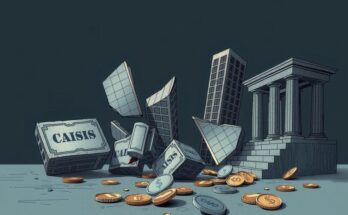President Bola Tinubu has declared a state of emergency in Rivers State, suspending the governor and lawmakers for six months due to security concerns over pipeline vandalism. Critics, including the Nigerian Bar Association, label this action unconstitutional and an attempt at state capture. This move reflects ongoing political instability in the region, with past precedents of similar emergency declarations in Nigeria.
Nigeria is experiencing a severe political crisis as President Bola Tinubu has declared a state of emergency in Rivers State, resulting in the suspension of the governor, his deputy, and all state lawmakers for six months. In a nationwide address, President Tinubu highlighted alarming security reports of pipeline vandalization by militants, indicating the governor’s failure to respond appropriately to the situation. He emphasized the necessity of intervening in what he termed a “grave situation.”
The state of emergency follows a significant blast that severely damaged the Trans-Niger Pipeline, one of Nigeria’s main crude oil conduits. The disruption caused by such attacks, often attributed to criminal gangs or militants, jeopardizes oil production and exports, which are immensely valuable to the national economy. Current valuations suggest the damaged pipeline may be responsible for approximately $14 million in daily revenue.
The political environment in Rivers State is tense, particularly due to internal conflicts within the People’s Democratic Party (PDP), led by Governor Siminalayi Fubara, which opposes Tinubu’s All Progressives Congress. President Tinubu remarked on the inability of local politicians to cooperate effectively amidst turmoil, citing threats made by Fubara’s allies against adversaries.
Furthermore, the Rivers State legislature had been contemplating impeachment proceedings against the governor and his deputy. The president characterized the political crisis as having caused a “standstill” in the state, arguing that the emergency declaration was a necessary step to restore order and peace. Under the emergency ruling, the government will oversee the state’s administration and deploy security forces as necessary.
However, various organizations have denounced this action. The Nigerian Bar Association (NBA) called the removal of elected officials unconstitutional, while the PDP labeled the emergency rule as an attempt at “state capture.” They accuse President Tinubu of endeavors to monopolize Nigeria’s political landscape, asserting, “It is the climax of a well-oiled plot to forcefully take over Rivers state.” Additionally, Peter Obi, former presidential candidate of the Labour Party, criticized the move on social media, deeming it “reckless.” Historical precedents exist for states of emergency in Nigeria, often implemented to mitigate insurgency and social instability across different regions.
In summary, President Bola Tinubu’s declaration of a state of emergency in Rivers State has stirred significant controversy amid escalating political tensions and security concerns regarding pipeline vandalism. The president’s actions, perceived by some as necessary to restore order, have drawn condemnation from legal experts and opposition parties alike. This episode highlights the intricate dynamics of Nigeria’s political landscape and raises questions about the effectiveness of emergency measures in addressing underlying issues.
Original Source: www.bbc.com




